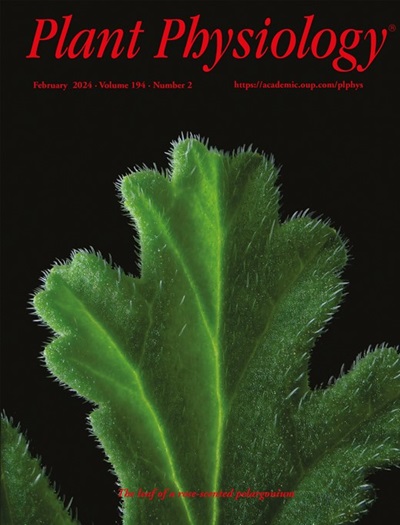HSFA1B-HSP70-3模块通过调节拟南芥SGS3的稳定性来调节跨代温度记忆。
IF 6.9
1区 生物学
Q1 PLANT SCIENCES
引用次数: 0
摘要
气候变暖引发的热浪深刻影响植物的发育和免疫。为了确保成功繁殖和跨代适应压力,植物已经进化出一种复杂的机制来部署跨代温度记忆,即开花早和免疫力减弱;这与热休克蛋白(HSPs)的诱导有关,热休克蛋白作为分子伴侣在热应激下稳定蛋白质。然而,热休克蛋白如何调节植物的跨代温度记忆在很大程度上仍然是难以捉摸的。在这里,我们发现热休克蛋白70-3 (HSP70-3)与基因沉默抑制蛋白3 (SGS3)相互作用,SGS3是一种植物特异性RNA结合蛋白,其跨代降解对拟南芥(拟南芥)的跨代温度记忆至关重要。HSP70-3与E3泛素连接酶SGIP1竞争SGS3结合。此外,HSP70-3被热应答转录因子HSFA1B直接靶向并激活。在长期热胁迫的植物及其非胁迫后代中,HSFA1B的下调参与了热记忆抑制HSP70-3的表达。因此,hsp70 -3介导的保护作用减弱导致E3连接酶SGIP1热诱导的SGS3降解。因此,我们的研究结果揭示了一个重要的调控模块HSFA1B-HSP70-3-SGS3在跨代温度记忆中的作用,揭示了HSP分子伴侣在植物温度记忆建立中的重要作用。本文章由计算机程序翻译,如有差异,请以英文原文为准。
The HSFA1B-HSP70-3 module regulates transgenerational thermomemory by modulating SGS3 stability in Arabidopsis.
Heat waves triggered by a warming climate profoundly affect plant development and immunity. To ensure successful reproduction and transgenerational adaptation to stress, plants have evolved a sophisticated machinery to deploy transgenerational thermomemory of early flowering and attenuated immunity; this is associated with the induction of heat shock proteins (HSPs), which act as molecular chaperones to stabilize proteins under heat stress. However, how HSPs regulate plant transgenerational thermomemory remains largely elusive. Here, we show that HEAT SHOCK PROTEIN 70-3 (HSP70-3) interacts with SUPPRESSOR OF GENE SILENCING 3 (SGS3), a plant-specific RNA binding protein whose transgenerational degradation is critical for transgenerational thermomemory in Arabidopsis (Arabidopsis thaliana). HSP70-3 competes with E3 ubiquitin ligase SGIP1 for SGS3 binding. Furthermore, HSP70-3 is directly targeted and activated by the heat-responsive transcription factor HSFA1B. The down-regulation of HSFA1B in plants under long-term heat stress and their unstressed progeny contributes to the thermomemory repression of HSP70-3 expression. Consequently, diminished HSP70-3-mediated protection results in heat-induced SGS3 degradation by the E3 ligase SGIP1. Our results thus reveal an important regulatory module, HSFA1B-HSP70-3-SGS3, in transgenerational thermomemory, shedding light on the essential function of HSP molecular chaperones in the establishment of thermomemory in plants.
求助全文
通过发布文献求助,成功后即可免费获取论文全文。
去求助
来源期刊

Plant Physiology
生物-植物科学
CiteScore
12.20
自引率
5.40%
发文量
535
审稿时长
2.3 months
期刊介绍:
Plant Physiology® is a distinguished and highly respected journal with a rich history dating back to its establishment in 1926. It stands as a leading international publication in the field of plant biology, covering a comprehensive range of topics from the molecular and structural aspects of plant life to systems biology and ecophysiology. Recognized as the most highly cited journal in plant sciences, Plant Physiology® is a testament to its commitment to excellence and the dissemination of groundbreaking research.
As the official publication of the American Society of Plant Biologists, Plant Physiology® upholds rigorous peer-review standards, ensuring that the scientific community receives the highest quality research. The journal releases 12 issues annually, providing a steady stream of new findings and insights to its readership.
 求助内容:
求助内容: 应助结果提醒方式:
应助结果提醒方式:


